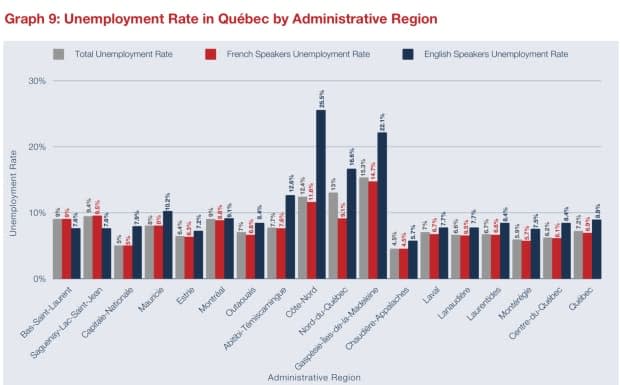English-speaking Quebecers face higher unemployment, earn less than francophones, report finds

Anglophone Quebecers in most regions of the province are more likely to be unemployed and to earn less than their francophone counterparts, according to a new report.
The report was compiled by the Provincial Employment Roundtable (PERT), a new non-profit organization that aims to address employment challenges for Quebec's English-speaking community, with funding from the Quebec government's secretariat for relations with English-speaking Quebecers.
Using data from the 2016 federal census and the provincial statistics agency, the Institut de la Statistique du Québec , the analysis found that Quebec's English speakers have an unemployment rate of 8.9 per cent, compared to 6.9 per cent for French speakers and an overall provincial unemployment rate of 7.2 per cent.
In 15 of 17 administrative regions, the unemployment rate for English speakers outpaced both the rate for French speakers and the average rate for the region.
The unemployment rates for English speakers was highest on the North Shore (25.5 per cent), the Gaspé peninsula and Magdalen Islands (22.1 per cent), northern Quebec (16.6 per cent) and the Abitibi-Témiscamingue (12.6).

In Montreal, unemployment rates for anglophones (9.1 per cent) and francophones (8.8 per cent) were roughly on par with the average of nine per cent.
Lower median income
The report also found that in 14 of 17 regions, including Montreal, English speakers have a lower median after-tax income than French speakers and the population on average.
The gap was widest in the Eastern Townships, the Abitibi-Témiscamingue, northern Quebec and central Quebec, where English speakers earned on average at least $4,000 less annually than their French-speaking counterparts.
Only in the regions of Chaudière-Appalaches, Saguenay-Lac-St-Jean and Mauricie did English speakers earn more.
"This ... old stereotype of English speakers as this homogenous kind of wealthy elite is undone by those findings," said PERT executive director Nicholas Salter.
Aki P. Tchitacov, executive director of YES Employment & Entrepreneurship, a non-profit organization that offers career services to the English-speaking community, said that old stereotype obscures the complex barriers that some English speakers face in finding a job.
"The unemployment rate for minority youth in Quebec is even higher," said Tchitacov. "People's impression of the community might be stuck in the 60s or the 70s. So there's work to be done, especially to educate decision-makers."
Data 'confirms what we knew'
Christopher Skeete, parliamentary assistant to the premier and the person responsible for relations with English-speaking Quebecers, said the results of the analysis are not surprising.
Skeete said the employment gap was the driving factor in creating the provincial roundtable, with $7.1 million in provincial funding over 5 years.
He said it is a "multi-faceted" problem and agreed that there are stereotypes and taboos that need to be broken down, in order to improve the employment situation of anglophone Quebecers.
"We need to show francophones that just because someone has an English-speaking accent, doesn't mean that they don't understand what's going on. That they're...fully able to write a memo in French, to express themself in French and that they believe in French," he said.
But he said there are English-speaking Quebecers whose lack of fluency "is an impediment to their ability to gain sustainable employment"
He says that's why the government included in Bill 96 a provision that states English-speaking Quebecers "have a right to learn French."
French second-language training needed
Through interviews with employment organizations, the study found that English speakers have trouble accessing French-language training that might help them adapt to French-language workplaces.
Salter said in the context of the current labour shortage, it's important to correct this.
"We have quite a diverse group of people, a workforce that is sitting, in some ways, idle and that can be mobilized to contribute towards the Quebec economy," said Salter. "We have to figure out solutions for how to do that."

The report used Statistics Canada's category of "first official language spoken" in determining who fell within the English-speaking community. Salter said the organization did not have data about the level of fluency within the English-speaking labour force by region.
According to the 2016 census, 69 per cent of people with English as a mother tongue in Quebec could hold a conversation in the other official language.
That's compared to 40 per cent of Quebecers whose mother tongue is French and 85 per cent of French-mother-tongue speakers in other provinces.
Tchitacov said that although most English speakers in Quebec do speak French, they may lack confidence in their second-language abilities.
"So what we tend to do is we self-select ourselves ... out of the application process because we're very nervous about our ability to be to be able to function in French and work in French, which is very, very unfortunate."
Skeete gave the example of English-speakers who gravitate toward the federal public service, instead of the provincial one. He said his wife, a nurse, also hesitated at first about working in a French hospital, because of her accent.
"And lo and behold, she went there, threw herself in it and earned the trust of her colleagues. So we need to build those bridges," said Skeete.
Lower labour participation in resource regions
Employment resources should be tailored to the needs of each region, Salter said.
For example, the report found that English speakers have lower labour force participation in regions where the economy is more focused on the resource sector and manufacturing, such as the Eastern Townships, Abitibi-Témiscamingue, northern Quebec, the Gaspé peninsula and Magdalen Islands as well as the Laurentians.
Salter points out that 40 per cent of Quebec's English-speaking population lives outside of Montreal.
"Those communities have been around for a long time ... and are resilient and have people working really hard to improve the circumstances for the community," said Salter. "They need resources, as well."
The report was compiled with financial support from Quebec's secretariat for relations with English-speaking Quebecers.


